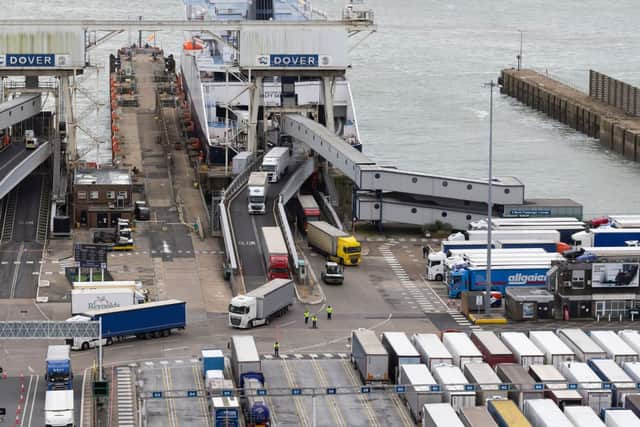These are the new laws coming into effect in 2022


The time around New Year is often a time when people decide to give new things a go in their lives.
But it is also often a time when new rules are legislated to come in.
Advertisement
Hide AdAdvertisement
Hide AdIn 2021, the New Year heralded the biggest change for businesses, particularly exporters, in almost 50 years as the UK formally left the EU.
But 2020 is set to be more low-key - although some of the changes will almost definitely impact on your life or your business.
So what are the new laws that are set to come in from 1 January and on into 2022?
Here’s everything you need to know.
The Highway Code
From 1 January 2022, the Highway Code will be changed in a bid to improve the safety of cyclists, horse-riders and pedestrians.
Advertisement
Hide AdAdvertisement
Hide AdIt will become a legal requirement for drivers to treat these road users with more consideration than is called for at the moment.
For example, Highway Code guidelines will advise motorists on how they should go about overtaking cyclists and horse riders.
Meanwhile, cyclists and pedestrians will be given priority at certain junctions.


Under the new rules, a ‘hierarchy of road users’ will be introduced.
Advertisement
Hide AdAdvertisement
Hide AdThose road users at greatest risk of injury in a collision will be placed at the top of this order.
As well as pedestrians, cyclists, horse riders and motorcyclists, vulnerable road using groups also include children, the elderly and disabled people.
Here are the new requirements drivers will have to follow under the new rules:
Cutting across cyclists, horse-riders or horse-drawn vehicles at junctions will be banned
Turning at a junction in a way that would require a cyclist or horse-rider to stop or swerve is set to be prohibited
Driving in a way that could risk a collision with a cyclist will be against the law
Cyclists, horse-riders and pedestrians will have to be given as much room as a car when overtaking - 1.5 metres for cyclists and two metres for horses
Motorists must pass horses at a speed of no more than 10mph. For cyclists, the maximum car overtaking speed will be 30mph
Where there is no pavement and a pedestrian is having to walk in the road, motorists must drop their speed to a low level and give the pedestrian a berth of at least two metres


Business changes
Many rules for businesses are changing in 2022, with Brexit being one source of the changes that are set to be introduced.
Here is what you need to know if you’re a business owner:
- From 4 January 2022 the National Security and Investment Act 2021 will come into force. This new law will require firms or investors seeking to buy UK companies in sensitive fields, like advanced robotics and energy, to seek and gain Government approval before completing their purchase. Similar rules are already in place in countries like the USA and Australia
- From 1 April when the 2022 new financial year kicks in, all UK companies liable to pay Corporation Tax will have to pay a main rate of 19%. This rate will apply to all non-ring fence profits over £250,000 (ring fence profits are segregated parts of a company. They can be used to protect assets if the business in question is taking a financial risk, for example). This rate is set to increase further in 2023 to 25%. A small profits rate will be brought in for firms with profits of £50k or less, so that they will continue to pay Corporation Tax at 19%
- Also from April, the National Living Wage is set to rise to £9.42 from £8.91 for those aged 23 and over. Statutory Maternity Pay, Statutory Paternity Pay, Shared Parental Pay, Adoption Pay, Maternity Allowance, Statutory Parental Bereavement Pay and Statutory Sick Pay will also change
- April will also see all UK businesses handling plastics, whether they be manufacturers, importers or consumers who buy plastic packaging or goods in plastic packaging, will be required to pay tax on any plastic packaging that doesn’t contain at least 30% recycled plastic. The rate will be set at £200 per metric tonne of plastic packaging
Brexit
Advertisement
Hide AdAdvertisement
Hide AdWhile Boris Johnson claimed he had got Brexit done at the end of 2020, some rules are still yet to come in for businesses involved in exporting or importing goods, particularly from the EU.
For example, from 1 January, you will have to pre-notify relevant authorities that you will be importing food, animal products, plants and plant products from the EU into Great Britain.
These rules are in place to protect the UK from importing any foreign pestilence or disease.
Under the Northern Irish protocol, this rule does not apply to businesses in Northern Ireland that are importing these goods from the EU - this is partly because the country shares what is called a sanitary and phytosanitary zone with the Republic of Ireland.
Advertisement
Hide AdAdvertisement
Hide AdCompanies in Britain that are doing so will have to register for a Government IT system.
You will also have to tell the relevant Government agencies where your goods have come from and provide proof they have come from a particular place under Rules of Origin laws.
Failure to do so could see your goods face extra tariffs or penalties.


Other goods can continue to be imported freely from Irish ports and you do not have to make your customs declaration for 175 days.
Advertisement
Hide AdAdvertisement
Hide AdIf your goods come into Great Britain from other EU countries, you will no longer be able to delay making import customs declarations.
Most customers will have to make declarations and pay relevant tariffs at the point of import, for example the Port of Dover, or they can employ a customs agent to do so on their behalf.
Should you wish to streamline this process, you can apply to HMRC for a special authorisation - although it takes 60 calendar days to get this status.
Finally, from 1 January, ports and other border locations will be required to control goods moving between Great Britain and the EU.
Advertisement
Hide AdAdvertisement
Hide AdIt means your goods have to have a valid declaration and have received customs clearance, or else they will likely not be allowed to leave the port - except from in Ireland.
The goods you’re importing or exporting may also be directed to a border facility away from the actual border for documentary or physical checks in some situations.
For more specific information, you can visit the Government website.